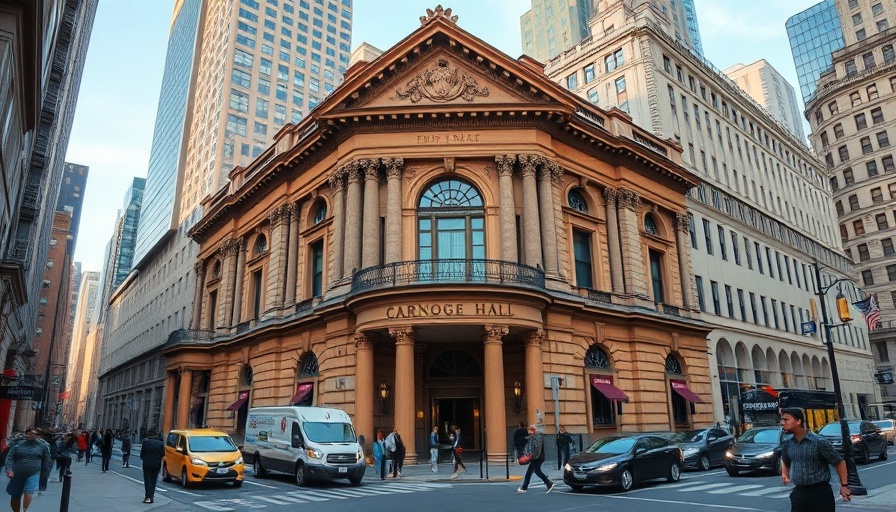
The Birthplace of Musical Legends
Carnegie Hall, a New York City icon, emerged from the dreams of visionaries in the Gilded Age, a period marked by immense cultural and industrial growth. In the spring of 1887, during a transatlantic voyage, industrialist Andrew Carnegie and conductor Walter Damrosch envisioned a magnificent concert hall that would serve as a beacon for musical excellence in New York City. Recognizing the urgent need for a cultural venue that could host the finest performances, Carnegie pledged a $2 million gift to establish 'The Music Hall Company of New York.' This pivotal moment laid the foundation for what would become a sanctuary for the arts.
A Testament to Visionary Architecture
The selection of the location on Seventh Avenue was strategic, placing Carnegie Hall just outside the bustling city center, yet within reach of the elite social circles that would come to frequent its polished halls. Architect William B. Tuthill was entrusted with the design, combining his understanding of acoustics with a beautiful Italian Renaissance style. This attention to architectural detail has ensured that Carnegie Hall is not only stunning to behold but also an acoustic marvel, hosting luminaries from Tchaikovsky to The Beatles.
An Opening Night to Remember
May 5, 1891, marked the opening of Carnegie Hall, and it was nothing short of spectacular. The audience was a who’s who of New York society—rockstars of their time, such as the Whitneys and Rockefellers. The ambiance was electric, with the Main Hall filled to capacity, horse-drawn carriages lining the streets, and the famed Symphony Society captivating the crowd with a blend of classical masterpieces. This night signaled Carnegie Hall's ascent as a premier venue for artistic performances, setting a high standard that resonates to this day.
A Continuous Legacy of Excellence
Over the years, Carnegie Hall has evolved into a cultural landmark, hosting not just concerts but also lectures, community events, and more. It stands as a testament to Andrew Carnegie’s belief in the transformative power of music and education. The hall has attracted renowned artists and composers throughout its history, and its archives house a wealth of materials that reflect its storied past.
Why Carnegie Hall Matters Today
For today's professionals—lawyers, accountants, and medical practitioners—Carnegie Hall is more than just a music venue; it represents an enduring commitment to the arts and community engagement. By attending performances or participating in discussions hosted at Carnegie, one connects to a rich history that fosters cultural appreciation and networking opportunities.
Embracing the Future While Honoring the Past
As we look toward the future, Carnegie Hall continues to adapt, introducing innovative programming while preserving its historical charm. Understanding its origins helps us appreciate not only the beauty of music but also the value of public art institutions in shaping community and cultural dialogues. With its focus on educational outreach, Carnegie Hall remains relevant, encouraging new generations to engage with music and the arts.
 Add Row
Add Row  Add
Add 




Write A Comment